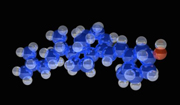Recent research has given hope to melanoma patients: vitamin D can help you survive this very serious disease. Studies have shown that those melanoma patients with high amounts of vitamin D in their bloodstreams were up to 30 percent more likely to survive.

Vitamin D is produced by the body when sunlight strikes the skin. Although too much sunlight raises the risk of skin cancers, higher levels of vitamin D translate to less severe lesions in melanoma. There are also lower rates of relapse in those patients getting an adequate amount of vitamin D.
Vitamin D can also be taken as a nutritional supplement, and many doctors advise their melanoma patients to boost their vitamin D levels with the addition of supplements to their diet. Some researchers have recommended up to 2000 International Units of vitamin D daily, although the current supplement recommendations are 200 to 600 units daily.
The first study linking vitamin D levels to melanoma survival was undertaken at the Cancer Research UK and the National Institutes of Health. The researchers in that study concluded that melanoma patients with high levels of vitamin D had thinner lesions than those who had levels that were too low. These researchers also believe that it is common in Western countries for people to get too little vitamin D. This is partly due to the fact that people tend to stay out of the sun to lower their overall risk of skin cancer, making it more important to eat foods high in vitamin D and to take daily supplements of the vitamin.
A second study done at the Dana-Farber Cancer Institute showed a lower incidence of death from colorectal cancer in patients with adequate vitamin D levels. People with higher blood levels were up to 50 times less likely to die from the disease. These researchers also plan to see if vitamin D has a similar effect on bowel cancer.
Vitamin D has many other health benefits as well. Adequate vitamin D levels protect against a number of diseases, including heart disease, infection, and general poor health and low energy. Vitamin D is necessary for the absorption of calcium, which is needed for proper bone health. Children with vitamin D deficiency are susceptible to rickets. This nutrient is essential to the maintenance and enhancement of the body’s health.
Many foods contain high vitamin D levels. This vitamin is found in fish, fortified milk and dairy products, eggs, and cod liver oil. Those who do not eat enough of these kinds of food and do not receive enough sunlight should take a daily supplement of this important vitamin.
 For those suffering from melanoma, the new research into the effects of vitamin D is excellent news. The vitamin makes survival much more likely and mitigates the seriousness of the disease. Ingestion of vitamin D at adequate levels significantly lowers the incidence of relapse. There is much hope in the medical community and among cancer patients that vitamin D will help you survive melanoma.
For those suffering from melanoma, the new research into the effects of vitamin D is excellent news. The vitamin makes survival much more likely and mitigates the seriousness of the disease. Ingestion of vitamin D at adequate levels significantly lowers the incidence of relapse. There is much hope in the medical community and among cancer patients that vitamin D will help you survive melanoma.
——
Vitamin D is a group of fat-soluble prohormones, the two major forms of which are vitamin D2 (or ergocalciferol) and vitamin D3 (or cholecalciferol). Vitamin D3 is produced in skin exposed to sunlight. Vitamin D regulates the calcium and phosphorus levels in the blood by promoting their absorption from food in the intestines, and by promoting re-absorption of calcium in the kidneys. It promotes bone formation and mineralization and is essential in the development of an intact and strong skeleton.
Article courtesy of Tree&Leaf.org









Stephanie - 14 years ago
This will be interesting reading……..